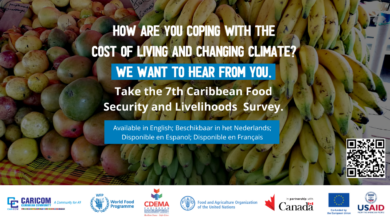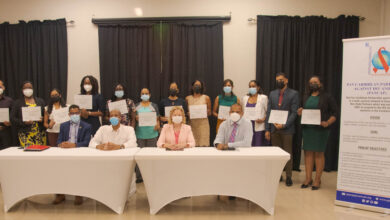Significant progress has been made in the Caribbean towards achieving the goals of the 2011 Political Declaration on HIV and AIDS, according to Mr. Shiraz Mohamed, First Secretary of the Guyana Permanent Mission and current Chair of the Caucus of Ambassadors to the United Nations (UN). Mr. Mohammed was speaking on behalf of the Member States of the Caribbean Community (CARICOM) to the UN General Assembly on 8 June, 2015, in New York.
Illustrating the Caribbean’s progress, he outlined its scorecard which included 52 per cent decline in HIV infections among children between 2001 and 2012. The decline was due to the availability of services to prevent mother-to-child-transmission to 90 per cent of pregnant women living with HIV. Mr Mohammed also highlighted the 49 per cent decline in HIV incidence over the past decade; reduced HIV prevalence from 1.5 per cent in 2002 to 1.0 per cent in 2012; and availability of antiretroviral treatment to 70 per cent of those eligible, resulting in a major reduction in deaths due to AIDS and improved quality of life for people living with HIV.
The CARICOM representative attributed these achievements to the fact that the Region had pursued functional cooperation, including in health and education, as an essential ingredient of its integration process.
He pointed to the role of the Pan Caribbean Partnership against HIV and AIDS (PANCAP), in the response to the epidemic as outlined in the Caribbean Regional Strategic framework, and further highlighted in the creative Justice for All programme. The latter was designed to respond to the elements of the UN political declaration with particular emphasis on reducing HIV-related stigma and discrimination.
Within this framework, Mr. Mohammed noted, the Caribbean First Ladies were championing every Caribbean women and child as a direct response to the priorities of the UN Secretary-General. So too were the CARICOM’s Health Ministers who have urged their Heads of Government to urgently consider strategies for joint action to ensure that the region continues to maximise the use of TRIPS-related flexibilities, including the Doha Declaration. This declaration, he explained, provided opportunities for Caribbean countries to expand access to low-cost, quality-assured pharmaceutical products and to pass laws to prevent patent ‘ever-greening’ practices.
He acknowledged that despite the progress, challenges remained and there was need to change the way business was done. He noted that this required leaders to demonstrate political will; civil society to maintain its activism; development partners to provide adequate and sustained financing of efforts to end AIDS; and strengthening national health systems.
Mr. Mohammed said also that greater efforts were needed to end the AIDS epidemic, including the promotion of linkages in the post-2015 development agenda between the AIDS response and other areas, particularly poverty eradication, employment creation and the empowerment of women and girls.







